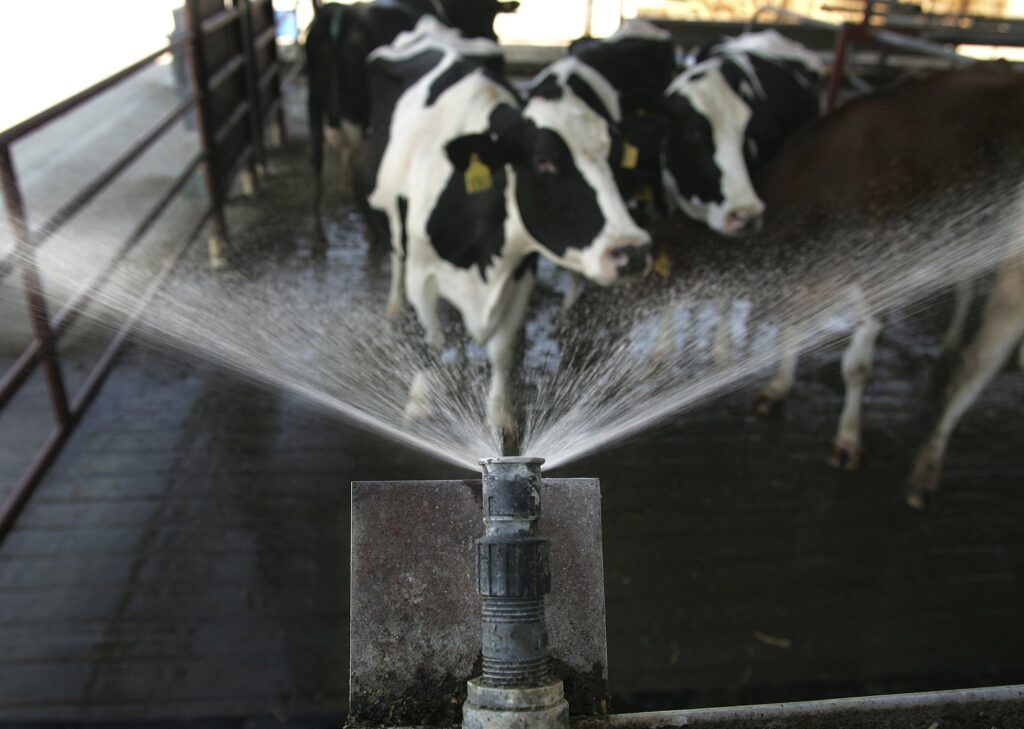Maintaining optimal feeding strategies for cows during hot summer days is crucial to ensure their health, well-being, and productivity. High temperatures and heat stress can negatively impact cows’ feed intake, nutrient utilization, and overall performance. This comprehensive guide aims to provide farmers and livestock managers with a detailed overview of feeding strategies to mitigate heat stress and support optimal cow nutrition during hot summer days.
Proper feeding strategies are essential during hot summer days to maintain cow health, promote milk production, and prevent negative impacts on fertility and overall performance. High temperatures can lead to heat stress, affecting feed intake, nutrient utilization, and metabolic processes in cows. Implementing effective feeding strategies can help alleviate heat stress and support optimal cow nutrition. Here are key nutritional considerations
Water Intake and Quality:

Providing an adequate and clean water supply is crucial for cows during hot weather. Increased water intake helps maintain hydration, regulates body temperature, and supports normal physiological functions. Ensuring easy access to water sources in pasture areas is crucial. Installing troughs or utilizing natural water sources can encourage cows to graze closer to water, promoting hydration and reducing heat stress.
Energy Requirements:
Heat stress increases energy expenditure in cows. Adjusting the energy density of the diet and providing easily fermentable carbohydrates can help meet increased energy demands and minimize the negative impact on milk production. Dasan feed is Pakistan’s best dairy feed having high source of energy contents that meets the required energy levels during hot summer days.
Protein Requirements:
High-quality protein is essential for maintaining milk production and supporting immune function during heat stress. Ensuring adequate protein levels in the diet is crucial to prevent negative effects on milk yield and cow health. Dasan Feeds are rich in protein and help animals to maintain their milk production during heat stress.
Mineral and Vitamin Supplementation:
Heat stress can disrupt mineral and vitamin metabolism in cows. Supplementing with essential minerals and vitamins, such as potassium, sodium, magnesium, and vitamins A, D, and E, can help alleviate the negative effects of heat stress and maintain optimal cow health.
Feeding Frequency and Timing:

Adjusting the feeding schedule during hot weather can help optimize nutrient intake. Providing feed during cooler hours, splitting meals into smaller portions, and adjusting feeding frequency can improve cow comfort and encourage feed consumption.
Forage Quality and Availability:
Ensuring high-quality forage is essential during hot summer days. Harvesting forages at the appropriate stage, minimizing storage losses, and preventing mold and mycotoxin contamination can support optimal cow nutrition and prevent digestive issues. Dasan silage is the best choice for consistent quality and availability not only in summer but through the year.
Feed Additives for Heat Stress Mitigation:
Certain feed additives, such as yeast cultures, probiotics, and antioxidants, have shown promising results in mitigating the negative effects of heat stress. Incorporating these additives into the diet can help support rumen function, improve nutrient utilization, and enhance cow resilience to heat stress.
Balanced Rations and Feed Formulation:

Formulating balanced rations that meet the specific nutrient requirements of heat-stressed cows is crucial. Properly balancing energy, protein, fiber, and mineral levels in the diet can support milk production, maintain body condition, and optimize cow health. Dasan Feeds are manufactured and balanced as per international standards.
Shade Provision:
Providing shade in pasture areas or using shade structures can help cows find relief from direct sunlight and reduce heat stress. Shade should be strategically placed to allow optimal airflow and prevent overcrowding.
Cooling and Environmental Modifications:

Using sprinklers and misters in feeding and resting areas can help cool cows by enhancing evaporative cooling. Proper placement and scheduling of sprinklers are crucial to maximize their effectiveness.
Installing fans and proper ventilation systems in barns and housing facilities can improve air movement, dissipate heat, and reduce heat stress. Maintaining optimal airflow and removing excess humidity is essential for cow comfort.
Monitoring and Evaluation:
- Regular body condition scoring helps assess the nutritional status and health of cows. Adjusting feeding strategies based on body condition scores can ensure optimal cow nutrition during hot weather.
- Monitoring ambient temperature and heat stress indexes allows farmers to identify periods of high heat stress and implement appropriate interventions promptly. Weather monitoring tools and heat stress calculators can aid in this process.
- Monitoring daily feed intake provides valuable insights into the effectiveness of feeding strategies. Comparing expected intake with actual intake helps identify potential issues and adjust rations accordingly.
Implementing optimal feeding strategies during hot summer days is essential to mitigate heat stress and maintain optimal cow health and productivity. Understanding the impact of heat stress on cows, considering key nutritional factors, implementing appropriate feed management strategies, and providing cooling and environmental modifications are crucial steps to support cows during periods of high heat stress. Regular monitoring and evaluation help ensure the effectiveness of these strategies, ultimately promoting the well-being and performance of the herd.
For further details please contact technical team of Dasan Feeds of your respective area.

